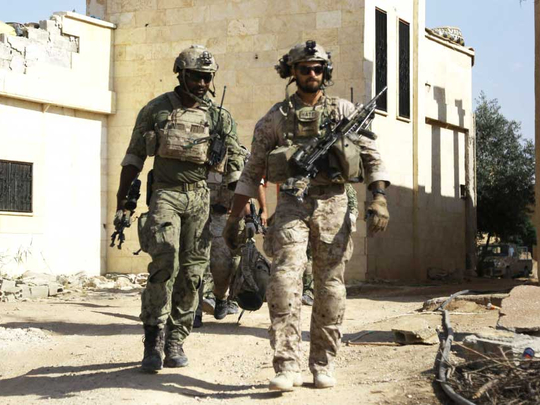
Washington: The US-led coalition fighting Daesh (the self-proclaimed Islamic State of Iraq and the Levant) in Syria is trying to strangle it by cutting off a key supply route from Turkey.
The Syrian Democratic Forces, a Kurdish-led alliance, has just launched an offensive to capture the strategic northern town of Manbij with the help of coalition air strikes, 18 of them in the past 24 hours.
On Thursday, the alliance vowed to drive Daesh from the town and nearby areas in northern Syria, urging civilians there to stay away from Daesh positions that would be targeted in the campaign.
“We confirm that this campaign will continue until the liberation of the last inch of the land of Manbij and its rural areas,” said a joint statement in the name of the attacking Syria Democratic Forces and allied Manbij Military Council. The statement was read out on the banks of the Euphrates River by Manbij Military Council commander Adnan Abu Amjad.
The statement urged civilians in Manbij to cooperate with the attacking forces and said control would be handed to a civilian council after the town was freed.
Manbij is on the north-south axis between Jarablus, a town on the border with Turkey and controlled by Daesh fighters, and Raqqa, the Daesh group’s self-proclaimed capital in Syria.
That axis is the main supply route to Raqqa, said Jennifer Cafarella, Syria analyst for the Institute for the Study of War, a Washington think tank.
If anti-Daesh fighters take Manbij and then Jarablus, that would sever this axis and leave the terrorist group with just a few rural areas further to the west as a way to maintain a link with Turkey, Cafarella said.
“Recapturing Manbij and ultimately advancing to Jarablus would disrupt but not eliminate [Daesh’s] ability to resupply,” she said.
The US-led coalition has long had its eye on the so-called Manbij pocket. But an offensive on this mainly Arab region has run into opposition from Turkey, a key partner in the alliance.
Washington sees the Syrian Democratic Forces — which is dominated by the Kurdish People’s Protection Units (YPG) — as the most effective ground force against Daesh in Syria.
But Ankara regards the YPG as a branch of the rebel Kurdistan Worker’s Party (PKK), which has fought a three-decade insurgency against the Turkish state.
Turkey does not want to see the YPG, which already controls much of the Turkish-Syrian border, take over the last bit of the frontier that it did not already hold.
On Wednesday Pentagon officials stressed that the attack on Manbij was being led by the Arab component of the Syrian Democratic Forces.
Kurds represent less than 20 per cent of the forces on the ground, a US official said.
And they will leave after the battle and cede control to their Arab partners, the official said.
But some are sceptical of the Pentagon’s assurances.
They suspect that despite Washington’s touting the role of the Arabs, it is the Kurds who will ultimately retain control.
“I doubt that they are in command and they are going to have control over this territory once Kurds will have spent their blood,” said Joshua Landis, director of the Centre for Middle East Studies at the University of Oklahoma.
The Pentagon has deployed more than 200 special forces troops alongside the Syrian Democratic Forces.
Last week, AFP photos of US special forces wearing YPG patches on their uniforms angered Turkey.
The United States responded by telling these forces to stop wearing the badge, but insisted that US troops would continue to help the Kurdish fighters, saying they were taking on Daesh militants efficiently.
Over the past 10 days the Syrian Democratic Forces have also launched an offensive to retake Raqqa, the main Daesh stronghold in Syria.












